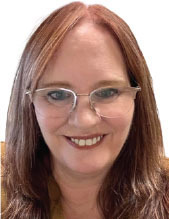
Disruptive Innovation
As I write this, it has been 2 whole weeks since I took the gavel from the fabulous Melanie Prince at the CMSA National Conference in Orlando. It has been an exciting and busy 2 weeks. I am so honored and thrilled to be able to serve this organization and the profession of case management.
As I mentioned in my remarks after the gavel exchange, the theme for my presidency is “disruptive innovation.” This term is usually defined as use of technology that “creates a new market by applying a different set of values which ultimately and unexpectedly overtakes an existing market” (Sensemeir, 2012, p. 13).
I will presume to extend the premise of “disruptive innovation” beyond technology, by looking at issues with an eye to creating simpler, perhaps more radical ways, to use existing resources or developing new resources in response to the new perspective on the issue.
Examples include Florence Nightingale using “pie charts and other early infographics to make her case for health-focused changes” (Grant, 2019, p.18); Lillian Wald establishing the public health services and early managed care interventions; Jane Addams and Mary Richmond’s work establishing the social work profession and developing case coordination models; and Ira Maud Cannon, for jointly organizing the first hospital-based social work program.
Creation of more current innovations such as the “crash cart,” the development of insulin therapy for diabetes, the evolution of glucometers/insulin pens, the early days of telehealth models of care from telephone to video and apps and more – these were all once “innovations” that that we cannot imagine being without in the current healthcare toolbox.
Simply put, I believe and advocate that it is our right and responsibility to disrupt processes when they are not working and propose new and innovative solutions to the issues we identify. Change is not comfortable. It makes us stretch, challenges us and makes demands. We seek comfort in the “ways things have always been,” but how is anything, especially healthcare, supposed to grow if we stay in what is comfortable?
Historical concepts such as fee for service and volume over value are quickly being replaced by value-based and patient-centric models. Case managers, regardless of discipline, have been the experts in patient-centered care and the social determinants of health long before they became fashionable and buzzwords. As the experts, it is our responsibility to provide the disruption and process in the development of the innovations.
We are aware of the importance of case management in areas such as readmission reduction. Just look at the body of knowledge developed around this subject over the past 20 years. A quick search of a university library database demonstrates over 120,000 articles on this topic since 1990. This very issue focuses on Readmission Reduction. Within this issue, you will find Dr. Hirsch’s review of the Hospital Readmission Reduction Program and Cheri Lattimer’s article on “Collaboration, Communication, Coordination,” which are important because readmission reduction is not accomplished by one group or specific to one setting.
Over 120,000 articles on readmission reduction…. imagine what we, as professional case managers, can do when we apply this same focus and expertise to areas regarding social determinants of health, health literacy, health equity, mental health equity and many others. I know that we are all doing exactly that: magnificent work in these areas. That work is changing the lives of our patients/clients/members. We are doing the work, and few know about what we do and how we impact outcomes. The imperative for the profession of case management then becomes dissemination and communication of our outcomes.
The world needs to know that:
- Case management interventions lead to better outcomes for our patients/clients/members.
- Every case manager is a leader on the healthcare team and, as such, should be included on every interprofessional transdisciplinary team. Our perspective and involvement are vital to the success of the patients/clients/members.
- And most importantly, the patients/clients/members need to be informed and educated that we exist, what we can do, how we can help them and how they can access us no matter the healthcare setting.
Nancy Skinner says it best. For 30 years, she has been saying that case management is the best kept secret in all of healthcare. This needs to change. Our voices need to be heard, our stories told and made available widely. I want to hear from every case manager, of any professional discipline. Tell me what you do to make healthcare more “patient centered,” “patient friendly” and more of a collaborative process of assessment, planning, facilitation, care coordination, evaluation, and advocacy for options and services to meet an individual’s and family’s comprehensive health needs through communication and available resources to promote patient safety, quality of care and cost-effective outcomes. (CMSA Standards of Practice, 2022).
REFERENCES
Brunson, M. E. (2021). Disruptive innovation for the unstoppable nurse leader. Nursing Management, 52(5), 22 – 29. https://doi.org/10.1097/01.numa.0000743416.28424.37 CMSA Standards of Practice. (2022).
Grant, E. (2019). We are innovators. American Nurse Today, 14(3), 18.
Sensmeier, J. E. (2012). Disruptive innovation and the changing face of healthcare. Nursing Management (Springhouse), 43(11), 13 – 14. https://doi.org/10.1097/01.numa.0000421681.71712.86.




